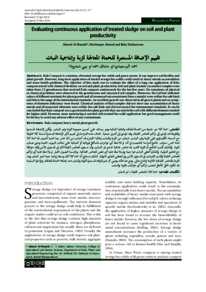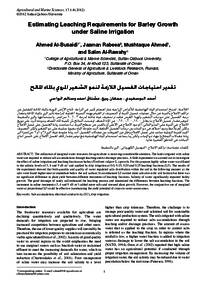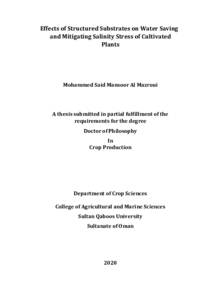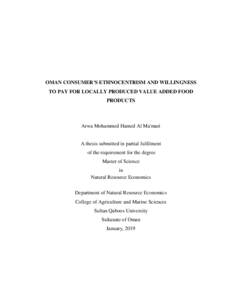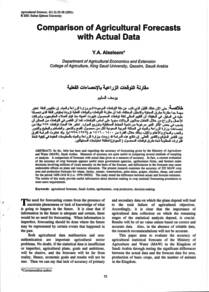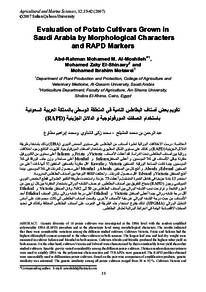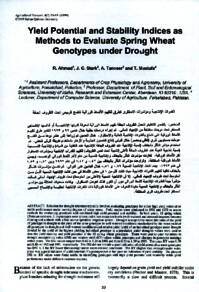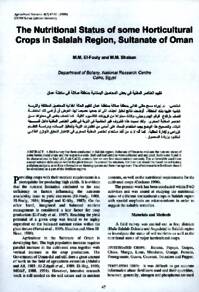Document
Evaluating continuous application of treated sludge on soil and plant productivity.
Contributors
Ahmed, Mushtaque., Author
Shaharoona, Baby., Author
Publisher
جامعة السلطان قابوس. كلية العلوم الزراعية والبحرية
Gregorian
2017
Language
English
Subject
English abstract
Kala Compost is a mixture of treated sewage bio-solids and green wastes. It can improve soil fertility and plant growth. However, long-term application of treated sewage bio-solids could result in heavy metals accumulation and some health problems. The objective of this study was to evaluate the effect of a long run application of Kala compost mixed with chemical fertilizer on soil and plant productivity. Soil and plant (mainly cucumber) samples were taken from 12 greenhouses that received Kala compost continuously for the last five years. No symptoms of physical or chemical problems were observed in the greenhouses and measured soil samples. Moreover, the soil had sufficient values of different nutrients for plant growth and all measured micronutrients (heavy metals) were within the safe limit and below the range of the international standards. An excellent growth was observed in all grown plants and no symptoms of elements deficiency were found. Chemical analysis of fruit samples did not show any accumulation of heavy metals and all measured elements were within the safe limit and did not exceed the international standards. It can be concluded that Kala compost was a good media for plant growth that can enrich the soil with different elements needed for higher yield. However, more monitoring is needed with treated bio-solid application but good management could be the key to avoid any adverse effect of any contaminant.
Member of
ISSN
2410-1079
Resource URL
Citation
Al-Busaidi, A., Ahmed, M., & Shaharoona, B. (2017). Evaluating continuous application of treated sludge on soil and plant productivity. Agricultural and Marian Sciences Journal, 22 (1), 2-7.
Arabic abstract
سماد كلا هو خليط من الحماة المعالجة والبقايا النباتية وهو يساعد على تحسين خصوبة التربة ونمو النبات. ولكن الإضافة المستمرة والطويلة قد تؤدي إلى تراكم العناصر الثقيلة، وقد تؤدي إلى أضرار صحية. تهدف هذه الدراسة إلى تقييم تأثر الإضافة المستمرة لسماد كلا مخلوطا مع السماد الكيماوي على التربة ونمو النبات. عينات من التربة والنبات (غالبا الخيار) قد أخذت من اثنا عشر بيتا محميا أضيف لها سماد كلا لمدة خمس سنوات. نتائج الدراسة تلخصت في أنه لم تلاحظ أي مؤشرات لمشاكل فيزيائية أو كيميائية على نباتات البيوت المحمية وحتى عينات التربة. وكذلك أثبتت النتائج أن التربة كانت بها عناصر غذائية تدعم نمو النبات، وأن مستوى العناصر الثقيلة كان في المستوى الآمن وكان متوافقًا مع المعاير الدولية. وكذلك أعطى النبات نموا جيدا ولم يلاحظ عليه أي نقص للعناصر الغذائية. وبالنسبة لمحصول الخيار لم يلاحظ عليه أي تراكم للعناصر الثقيلة وكانت القراءات في المستوى الآمن ولم تتخطى المعاير الدولية. لذلك نستنتج أن سماد كلا كان وسطا زراعيا جيدا لنمو النبات ويمد التربة بالعناصر الغذائية اللازمة لإنتاج عالي. ومع هذا فإنه يوصى أن تتم المراقبة المستمرة للتربة والنبات عند إضافة الحماة المعالجة، والإدارة السليمة قد تكون الحل الأمثل لتجنب تراكم أي ملوثات بالتربة والنبات.
Category
Journal articles

